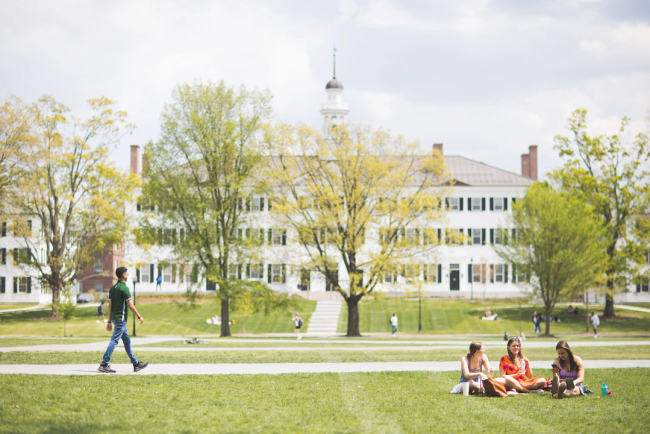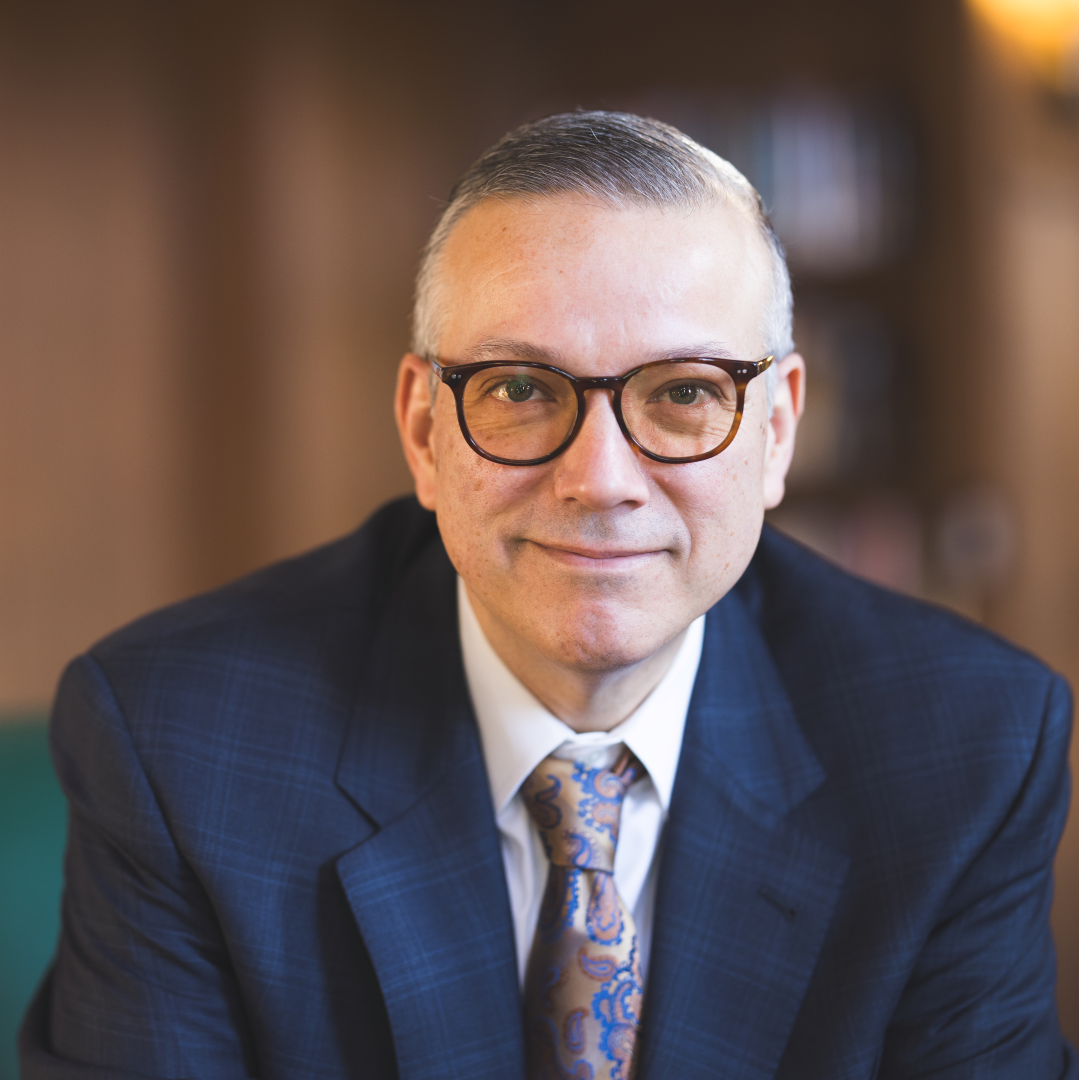You have /5 articles left.
Sign up for a free account or log in.

Starting this spring, Estevan Garcia will serve as the chief wellness officer at Dartmouth College, showing an institutional priority for campus community members’ health and well-being.
Dartmouth College/Katie Lenhart
To create college-wide support for mental health and wellbeing, Dartmouth College recently hired a chief wellness officer to unite services and departments and to improve visibility of healthy habits.
Estevan Garcia, a pediatric emergency medicine physician, most recently served as the chief medical officer of the Massachusetts Department of Public Health. In his new role, Garcia will oversee the Dartmouth College Health Service, the Student Wellness Center and Employee Wellness, while also serving on the president’s senior leadership team.

Estevan Garcia, Chief Wellness Officer at Dartmouth College
Dartmouth College / Katie Lenhart
Garcia spoke with Inside Higher Ed about his transition to working in higher education, student loneliness and how to support faculty and staff.
Q: You worked as a clinician for most of your career. What drew you to a role in higher education?
A: As we all know, there has been a significant impact on mental health with COVID. COVID has significantly detrimentally impacted mental health. One of the concerns that I’ve had is that I am seeing patients clinically in crisis. I was telling a story the other day that, when I trained—and again, it was in the ’90s—but we did not have formal emergency management of mental health crisis training.
I think there was, “Go spend a day in the psychiatric ED [emergency department].” It just wasn’t the way it is today. So trying to even understand, “How do I evaluate and manage these patients?” And yes, we’ve figured it out because we had to, but that’s the difference. Now, it’s part of your training, you understand it. It’s become such an issue for us. So while there were lots of issues for folks before COVID, COVID exacerbated all of those issues.
One of the things that drew me to this position is—and there are lots of them … but when I think about Dartmouth, and what’s already happened, and what we can be doing together moving forward—the idea of really impacting students before they’re in crisis.
The example I use is asthma. As a clinician—and I’m a clinician at heart—but as a clinician, we have ways to keep patients with asthma from coming into the emergency department. If you make it to the emergency department, it’s often a failure of outpatient management.
When I think about our young adults in crisis—and we take care of them, you know, upwards of age 25, sometimes in pediatric emergency departments—I just don’t know what we’ve done for them to prevent that crisis. And what Dartmouth is doing is saying they want to be able to help students manage day-to-day life—I think about it as resilience, but it’s even more than that—but to be able to manage day-to-day life and hopefully prevent some of this crisis.
Acknowledge that it’s going on, acknowledge that mental health and mental illness is part of our students’ lives. And we should be able to help them manage it before they get there—not to say that you may not need an emergency department for acute stabilization, that’s completely normal—but are there opportunities for us to manage that sooner?
Students spend quite a bit of their lives in academics as young adults, and we want to be able to really empower them to go forward … The president said that, “You can’t have academic excellence without wellness.” And to me, that really drew me to this opportunity as well. So I think that that’s why I’m interested in the role. And I’ll use, hopefully, my platform as the chief health and wellness officer to be able to then start instilling some of those supports around students to then go on and become who they fully can become and leaders in their fields.
Q: Across selective institutions, higher education leaders are looking to address a culture of toxic perfectionism. Where do you see the need to address this among high-achieving students?
A: I think that’s one of the—you know I’m sure it’s not unique to Dartmouth, but certainly schools that are as high-achieving attract students that are high-achieving and much of the pressure that’s put on students, some of it is put on students by the expectations of the faculty and staff, and some of it is their families or other parts of their lives—so I think what’s going to be important is to normalize the opportunity to have really thoughtful discussions about how wellness, does it detract [from achievement]?
Taking the time that you need for yourselves only strengthens that [achievement]. I think that’s where we’ll have to spend some of our time: really breaking down some of those barriers to students feeling that way and to ourselves, to be honest.
Most folks that are sitting on Dartmouth’s campus didn’t get there without being very driven and motivated. So it’s going to be important to also model the behavior. That’s why I appreciate that [my] role is a college-based role—it’s for all of our faculty and staff.
I think it’s going to be very important for the faculty and staff to model behaviors for our students, students learn from their mentors, and this needs to be something that their mentors can discuss freely with them. We’ve started this training already, prior to my arrival, but we’ll continue training faculty and staff.
Q: Can you talk more about how your role supports faculty and staff?
A: What will come under my office is the Student Health Services, Student Wellness Services and the Campus Wellness Services for faculty and staff. I think one of the opportunities there is that we are going to bring these [together]—they’re not three silos, they’re not three separate departments. We’re gonna bring them together. We’re gonna be able to support each other.
I think there’s real opportunity to look at the way faculty and staff engage in wellness behaviors, engage in taking care of their own personal health, to be able to then model that and work with students in that way.
I do think it’s going to be important for me to spend the time, initially. I need to talk to students and understand what the needs are, get to know the culture … We’ll be spending time with faculty and staff to understand what their needs are, the uniquenesses and the challenges.
Dartmouth is a relatively rural campus. And so, as we see across many rural communities—and my role currently at DPH—primary care providers is a challenge, attracting them, maintaining them, supporting them to make sure that we’re meeting the needs of our faculty, staff and students when it comes to all of those components of wellness.
Q: Getting to know the campus and its community is obviously highly important in this work. Where do you see the role of listening to your colleagues and understanding the institution prior to starting your work?
A: The interview process was incredibly informed. There was a lot of information available. We have a strategic plan that the campus developed under the president’s leadership and so I felt like I was starting with a bit of a cheat sheet on areas to address and move very quickly.
I’m a pediatric emergency medicine doctor; I do emergency medicine. I tend to want to diagnose and treat; that’s my [experience]. So, as an administrator in healthcare and now on a college campus, it’s going to be important to pull back a little bit and to really get more of a sense of what’s going on. I was quite honest with folks, I said, “Please feel free to say, ‘We hear you, but give us a few minutes.’” Because that’s the way I tend to be. So I’m hopeful that my kind of listening tour will be very insightful and will help direct the way we will move forward.
I need to spend time with my departments that are reporting up and understand what their needs are. Really impressive information already, I have annual reports and all kinds of things that have come through. But my goal is to be visible on campus and have the opportunity to engage students, faculty and staff to understand what their needs are.
I’m a walker, that’s what I do for my health, so I plan to have walking meetings. Maybe not in 20-degree temperature, but there’s lots of fall time, spring time and summer. I really enjoy doing that and I feel like it’s a productive way for us to engage a little bit in our own wellness. Nature is super soothing and calming as well, and Dartmouth is an ideal campus for that.
Q: The Surgeon General announced that the U.S. is in an epidemic of loneliness, and particularly young adults. While it’s not quite the same as health and wellness, where do you see your role in supporting social belonging and some of the abstract concepts of health and wellness?
A: I actually think that’s key to the work that we need to do moving forward.
Again, Dartmouth is unique in the setting, there are lots of rural campuses, but as an Ivy in a rural setting, there’s certainly loneliness and isolation that students will face but others that our staff and faculty face. So I do think that developing belonging, really embedding belonging into orientation for new students, for new faculty and new staff. How do we leverage the really great people that work there, that live there, the community, the town, to support our campus and to support our students?
We have to acknowledge that it’s an ongoing epidemic, it’s an epidemic that’s multigenerational.
My approach at Dartmouth is going to be, “Let’s think outside the box.” Volunteerism gives you meaning, it supports who you are and is that an opportunity for us to try to figure out what’s available and how can we expand that? Mentoring those who need support. Student mentoring helped me get through college and I think that would be really important to think about who could do that as well.
Seeking stories from campus leaders, faculty members and staff for our Student Success focus. Share here.








